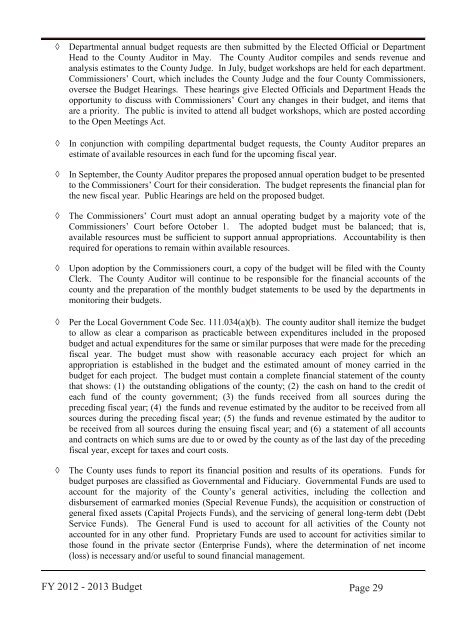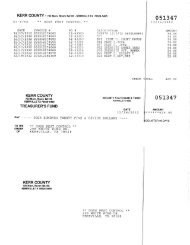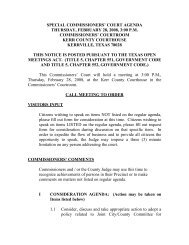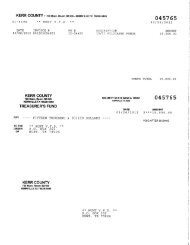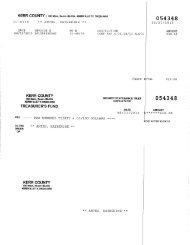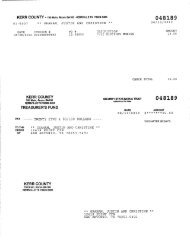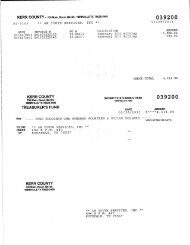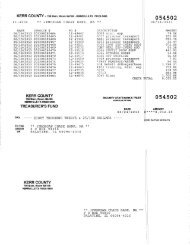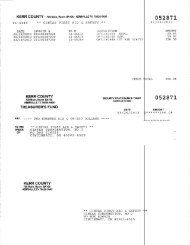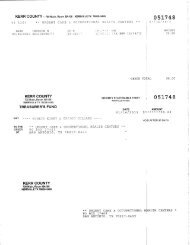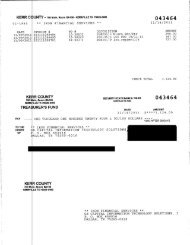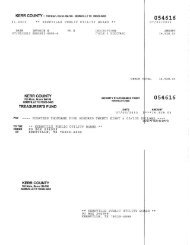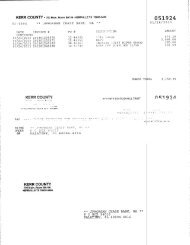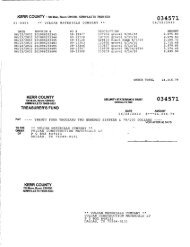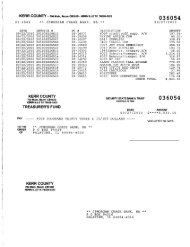Adopted Budget FY 2012-2013 - Kerr County
Adopted Budget FY 2012-2013 - Kerr County
Adopted Budget FY 2012-2013 - Kerr County
Create successful ePaper yourself
Turn your PDF publications into a flip-book with our unique Google optimized e-Paper software.
◊ Departmental annual budget requests are then submitted by the Elected Official or Department<br />
Head to the <strong>County</strong> Auditor in May. The <strong>County</strong> Auditor compiles and sends revenue and<br />
analysis estimates to the <strong>County</strong> Judge. In July, budget workshops are held for each department.<br />
Commissioners’ Court, which includes the <strong>County</strong> Judge and the four <strong>County</strong> Commissioners,<br />
oversee the <strong>Budget</strong> Hearings. These hearings give Elected Officials and Department Heads the<br />
opportunity to discuss with Commissioners’ Court any changes in their budget, and items that<br />
are a priority. The public is invited to attend all budget workshops, which are posted according<br />
to the Open Meetings Act.<br />
◊ In conjunction with compiling departmental budget requests, the <strong>County</strong> Auditor prepares an<br />
estimate of available resources in each fund for the upcoming fiscal year.<br />
◊ In September, the <strong>County</strong> Auditor prepares the proposed annual operation budget to be presented<br />
to the Commissioners’ Court for their consideration. The budget represents the financial plan for<br />
the new fiscal year. Public Hearings are held on the proposed budget.<br />
◊ The Commissioners’ Court must adopt an annual operating budget by a majority vote of the<br />
Commissioners’ Court before October 1. The adopted budget must be balanced; that is,<br />
available resources must be sufficient to support annual appropriations. Accountability is then<br />
required for operations to remain within available resources.<br />
◊ Upon adoption by the Commissioners court, a copy of the budget will be filed with the <strong>County</strong><br />
Clerk. The <strong>County</strong> Auditor will continue to be responsible for the financial accounts of the<br />
county and the preparation of the monthly budget statements to be used by the departments in<br />
monitoring their budgets.<br />
◊ Per the Local Government Code Sec. 111.034(a)(b). The county auditor shall itemize the budget<br />
to allow as clear a comparison as practicable between expenditures included in the proposed<br />
budget and actual expenditures for the same or similar purposes that were made for the preceding<br />
fiscal year. The budget must show with reasonable accuracy each project for which an<br />
appropriation is established in the budget and the estimated amount of money carried in the<br />
budget for each project. The budget must contain a complete financial statement of the county<br />
that shows: (1) the outstanding obligations of the county; (2) the cash on hand to the credit of<br />
each fund of the county government; (3) the funds received from all sources during the<br />
preceding fiscal year; (4) the funds and revenue estimated by the auditor to be received from all<br />
sources during the preceding fiscal year; (5) the funds and revenue estimated by the auditor to<br />
be received from all sources during the ensuing fiscal year; and (6) a statement of all accounts<br />
and contracts on which sums are due to or owed by the county as of the last day of the preceding<br />
fiscal year, except for taxes and court costs.<br />
◊ The <strong>County</strong> uses funds to report its financial position and results of its operations. Funds for<br />
budget purposes are classified as Governmental and Fiduciary. Governmental Funds are used to<br />
account for the majority of the <strong>County</strong>’s general activities, including the collection and<br />
disbursement of earmarked monies (Special Revenue Funds), the acquisition or construction of<br />
general fixed assets (Capital Projects Funds), and the servicing of general long-term debt (Debt<br />
Service Funds). The General Fund is used to account for all activities of the <strong>County</strong> not<br />
accounted for in any other fund. Proprietary Funds are used to account for activities similar to<br />
those found in the private sector (Enterprise Funds), where the determination of net income<br />
(loss) is necessary and/or useful to sound financial management.<br />
<strong>FY</strong> <strong>2012</strong> - <strong>2013</strong> <strong>Budget</strong><br />
Page 29


